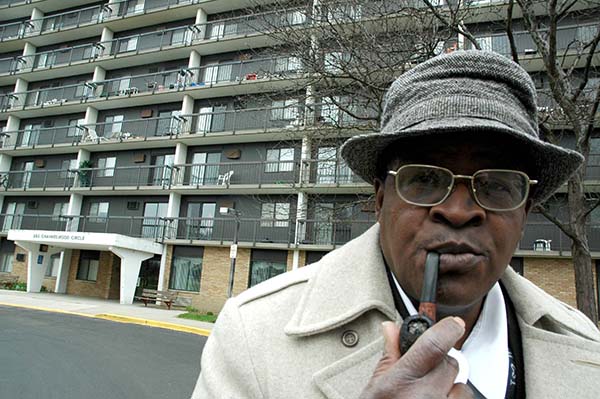Black Keys Fund

The first time Black Keys drummer Pat Carney heard of Alfred McMoore, it was via answering machine. "This is Alfred McMoore. Your black key is taking too long."
The message was meant for Pat's father, Beacon Journal writer Jim Carney, who was writing an article about the artist. But in the following months and years, that puzzling phrase became a constant part of Pat's own life as the recordings began to multiply, with McMoore leaving 20, 30, sometimes even 40 messages in a single day.
Seemingly used as an insult, McMoore often told people their "black key was taking too long" when he couldn't immediately get in touch with them. Jim said he believes the term "black key" referred to something that was "off-center," or "not quite right."
In most people's eyes, Alfred McMoore was exactly that.
As an artist who battled schizophrenia most of his life, McMoore would make dozens of calls to ask for a new roll of paper or the crayons he needed for his artwork. Often, he just wanted someone to listen. Jim Carney and his neighbor, Chuck Auerbach, filled that role. Chuck was an art collector who had also befriended McMoore, helping him sell many of his eclectic sketches.
It was around this same time that Pat, along with Chuck's son Dan Auerbach, was trying to decide on a name for the band the two classmates were forming. Their mutual connection to Alfred McMoore made it a natural choice.
The Black Keys formed in 2001 and went on to achieve international acclaim. By May 2010, their newest album, "Brothers," had debuted at No. 3 on the Billboard 200, eventually peaking at No. 1. The band counts among its fans punk rock legend Iggy Pop, Radiohead lead singer Thom Yorke, and Led Zeppelin frontman Robert Plant.
But Pat and Dan never forgot the man who inspired it all, and when McMoore passed away in September 2009 at age 59, the friends organized a benefit concert at Musica in his honor.

The concert drew hundreds of fans and raised more than $20,000 for an endowment fund later created at Akron Community Foundation. The Black Keys Alfred McMoore Memorial Fund was established in June 2010 as a permanent income stream for Community Support Services – the local nonprofit organization that helped McMoore rise above his mental health issues and lead an active and independent life.
According to the agency's president and CEO, Terry Dalton, Community Support Services acts as a safety net for clients with severe and persistent mental illnesses, helping them get the psychiatric, medical and personal care they need. In McMoore's case, CSS helped him stay healthy and out of the hospital, but more than anything, it helped him embrace his strengths and develop lifelong friendships.
One of those friendships was with Darrell Hill, a security guard at CSS whose relationship with McMoore grew out of a daily routine. "The first time I saw him, he was riding his bicycle with a full suit on and a big basket in front of his bicycle. He was flying in the parking lot, and I said, 'Alfred, you're moving pretty quick in that parking lot. How fast can you go on that bicycle?' And he said, 'I go 400 miles an hour.' That was our first meeting."
Although McMoore was initially cautious around Hill, whose uniform and badge seemed intimidating, he eventually warmed up and began greeting Hill with a wide smile and his signature "half hug."
"He was kind of apprehensive (originally)," Hill recalled. "He always said, 'Police Officer, I'm not doing anything.' And I would say, 'Al, just call me Darrell.'"
Hill fondly remembers McMoore's unusual wardrobe, saying he never saw him with fewer than six overcoats on in the winter – so many he couldn't even fold his arms. "And he always wore a suit and tie," Hill said. "It would be 90 degrees and he'd have a suit and tie on and be riding his bicycle."
But his favorite thing was the phone. "He'd call (CSS) all the time, drive the receptionist crazy. There were two things that were most important in his life: his pipe tobacco, and his 5-foot-wide paper, which he did all his artwork on. Whenever he was close to running out of those, he would call almost every hour on the hour."
Art was the anchor of McMoore's life. From the time he was a child, he found solace and purpose in his drawings, which he typically did in pencil and crayon on giant rolls of paper. During times of crisis, Hill said he would curl up into a fetal position – directly on top of the paper – and draw all night.
"Artwork was his support system," Hill said. "No matter what he was going through, he would go back to his drawings and draw and draw and draw. It took him away from everything, kept him out of the hospital."
While many people find art to be an escape, Stephanie Auerbach, wife of the band's guitarist and coordinator of the 2009 benefit, said art is especially important for people with mental illnesses. "Having a mental disability has such a social stigma attached (to it)," she said. "Your sense of self worth may get lost in the darkness." By channeling those feelings into their artwork, many people with mental illnesses find their identity, self-esteem and what she called "freedom from the dark."
Classified as an "outsider artist," McMoore's work was not defined by a particular style or era. Instead, he was recognized for his own distinctive style, which included tracing images with a pencil and then coloring them in with crayon. Noticeable in his crayon markings were impressions left by the linoleum floor of his apartment, a pattern that fascinated even well-trained artists.
Community Support Services recognized his tremendous talent and embraced it, making sure McMoore never ran out of supplies. When he was featured in the Akron Beacon Journal, the staff brought in 50 copies of the paper and asked McMoore to do an autograph signing.
"We posted it in the lobby and said, 'Al, you're on the front page here. You're famous.' And he sat in the lobby signing autographs all day. He was so nonchalant. It was just another day in Alfred McMoore's life."
McMoore often carried his huge rolls of paper to CSS, where he would roll it out in the parking lot for people to see. His drawings were complex and often puzzling: images of his nurses with huge muscles, police officers in high heels. If he really liked someone, he would draw the person in an elaborate burial casket.
This fascination with funerals carried into real life, in which McMoore frequently went to the calling hours and funerals of complete strangers. While there, he would mourn as heavily as a close family member, sobbing for people he had never met. Many who knew him referred to him as Akron's professional mourner.
In one of Hill's most treasured memories, he was on his way to a funeral when he saw McMoore in the CSS lobby. When he mentioned his plans, McMoore immediately began crying inconsolably and gave Hill a tight hug. "I said, 'Al, it's not my funeral, I'm just going to a funeral.' And he ended up going with me to Stewart & Calhoun (Funeral Home). It showed that his love was unconditional."
In an upcoming documentary about McMoore, Stewart & Calhoun funeral director Preston Stewart said funerals seemed to be an outlet where McMoore could express his emotions. McMoore would often call to inquire about an upcoming service, asking, "Is it going to be a big one?"
On Sept. 28, 2009, nearly 300 people paid their final respects to McMoore, a funeral most would refer to as "a big one." He is buried at Mt. Peace Cemetery in Akron, but his art can be seen at the Akron Art Museum and a museum in France.
Prior to his death, McMoore counted on Community Support Services to check in on him at his Thornton Street apartment. His caseworkers – and often just friends at the agency – would stop by to make sure he was maintaining his apartment and eating well. But it was CSS' commitment to fostering McMoore's passion for art that truly allowed him to be independent and happy.
"Without CSS and the support they gave him – the monitoring, supervision, encouragement, getting involved with his drawing – there's no question he would have been hospitalized somewhere," Hill said. "We always asked, 'What can we do to improve his quality of life?' We did that by rediscovering his strengths and abilities and working on that."
This philosophy drives Community Support Services' relationship with all of its clients. Dalton said the agency makes it a priority to identify and embrace clients' talents and strengths. With the income from their endowment fund at Akron Community Foundation, CSS will be able to encourage all forms of talent – particularly McMoore's beloved art.
"Hidden beneath the mental illness, many of our clients have terrific talents, including artistic abilities," Dalton said. "Community Support Services intends to continue to sponsor an art contest and exhibition that will showcase the artistic capabilities of those we serve. Through the Black Keys Alfred McMoore Memorial Fund, we hope to expand this effort to include all forms of artistic interest."
With the support of CSS, other clients will be able to unearth their talents and use them to enrich Greater Akron – much like McMoore did with his artwork. Dalton said he is confident McMoore would be honored to know this fund was created in his honor.
"There is no doubt in my mind that Alfred would be thrilled," Dalton said. "Alfred was one of a kind. It didn't matter if he was talking with me as the CEO or to Darrell as the security guard or to a client in the parking lot. Alfred was Alfred, and he clearly made a positive impression and lasting memory for us all."
Hill wholeheartedly agreed, saying Alfred had a "heart of gold" that touched the lives of everyone around him. "He made a great impact in not only my life but in a lot of the clients (at CSS)," Hill said. "As professionals, we've been trained to maintain our boundaries and not get too personally involved with clients. But with Alfred, you couldn't help it. You just fell in love with the guy."
